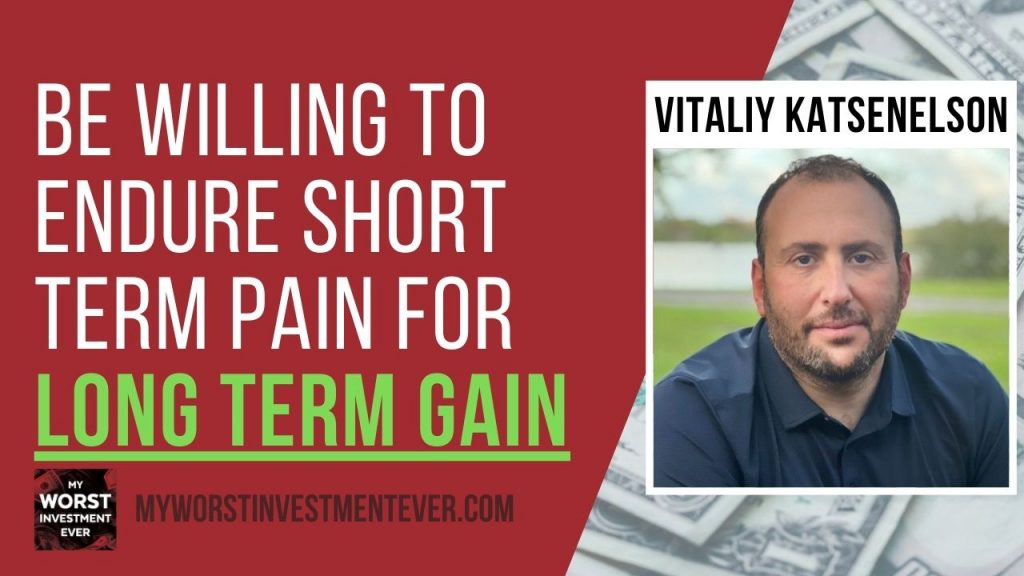Ep587: Vitaliy Katsenelson – Be Willing to Endure Short Term Pain for Long Term Gain

Listen on
Apple | Google | Stitcher | Spotify | YouTube | Other
Quick take
BIO: Vitaliy has written two books on investing and is an award-winning writer. Known for his uncommon common sense, Forbes Magazine called him “The New Benjamin Graham.”
STORY: Vitaliy bought stocks in a company that had been named the worst company ever. He bought the stock at $16, it went to $10, and then up to $26. Vitaliy sold, and this is a decision that he regrets. Today, the stock is at $120.
LEARNING: Be willing to endure short-term pain for long-term gain. Don’t stop researching. Use stop losses to exit bad investments.
“Don’t shrink your investment time horizon.”
Vitaliy Katsenelson
Guest profile
Vitaliy Katsenelson was born in Murmansk, USSR, and immigrated to the United States with his family in 1991. After joining Denver-based value investment firm IMA in 1997, Vitaliy became Chief Investment Officer in 2007 and CEO in 2012. Vitaliy has written two books on investing and is an award-winning writer. Known for his uncommon common sense, Forbes Magazine called him “The New Benjamin Graham.”
He’s written for publications including Financial Times, Barron’s, Institutional Investor and Foreign Policy. His articles are also published on his website, ContrarianEdge, and in audio format on his Intellectual Investor Podcast. Vitaliy lives in Denver with his wife and three kids, where he loves to read, listen to classical music, play chess, and write about life, investing, and music. Soul in the Game is his third book and first noninvesting book.
Worst investment ever
Ten years ago, Vitaliy invested in Electronic Arts (EA), a gaming company. At the time, the company had been named by Consumerist magazine as the worst company ever. The company spent 500 million dollars on a Star Wars game that flopped.
When Vitaliy was buying the stock, a couple of things were happening. People were transitioning from purchasing games at the store to downloading games. Smartphones were becoming a significant market for video games. With this in mind, Vitaliy figured the gaming market was about to become much more extensive; therefore, EA’s profitability would skyrocket. So he bought the stock at $16 despite the negative valuation.
The following year the stock went to $10. Vitaliy was frustrated. Then over the next year, the stock went up to $26. He was over the moon. He had just doubled his money. Vitaliy decided to sell because he was just so exhausted from owning the stock. This is a decision that he regrets. Today, the stock is at $120.
Lessons learned
- When investing, you have to be willing to endure short-term pain for long-term gain.
- Go in with your eyes open.
- Don’t shrink your investment time horizon.
- Precondition yourself through the negative realization that stocks can decline 30-50% so that it doesn’t hurt as much when it happens.
- Don’t stop doing research.
Andrew’s takeaways
- Use stop losses to exit a poorly performing stock, then reenter that position later when you feel the timing is better.
Actionable advice
When picking a stock, consider the company’s earnings power for the next three, four, or five years.
Vitaliy’s recommended resources
- Download The Six Commandments of Value Investing for FREE to learn the principles behind the investing approach popularized by Warren Buffett and how you can apply them in the real world.
- Listen to his Intellectual Investor Podcast for the best investing tips.
No.1 goal for the next 12 months
Vitaliy’s number one goal in life is just to wake up every day and live every day as if it was his last day and simply have a healthy, happy day.
Parting words
“Let’s enjoy life and prosper.”
Vitaliy Katsenelson
Connect with Vitaliy Katsenelson
Andrew’s books
- How to Start Building Your Wealth Investing in the Stock Market
- My Worst Investment Ever
- 9 Valuation Mistakes and How to Avoid Them
- Transform Your Business with Dr.Deming’s 14 Points
Andrew’s online programs
- Valuation Master Class
- The Become a Better Investor Community
- How to Start Building Your Wealth Investing in the Stock Market
- Finance Made Ridiculously Simple
- Best Business Book Club
- Become a Great Presenter and Increase Your Influence
- Transform Your Business with Dr. Deming’s 14 Points

